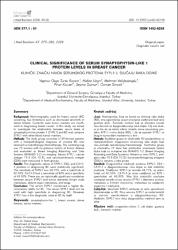CLINICAL SIGNIFICANCE OF SERUM SYNAPTOPHYSIN-LIKE 1 PROTEIN LEVELS IN BREAST CANCER

Access
info:eu-repo/semantics/openAccessDate
2024Author
Kösem, Yağmur Özge TuraçUzun, Hafize
Velidedeoğlu, Mehmet
Kocael, Pınar
Dümür, Şeyma
Şimşek, Osman
Metadata
Show full item recordCitation
Turaç Kösem, Y. Ö., Uzun, H., Velidedeğlu, M., Kocael, P., Dümür, Ş., & Şimşek, O. (2024). CLINICAL SIGNIFICANCE OF SERUM SYNAPTOPHYSIN-LIKE 1 PROTEIN LEVELS IN BREAST CANCER. JOURNAL OF MEDICAL BIOCHEMISTRY, 43(2), 273-280. https://doi.org/10.5937/jomb0-46198Abstract
Background: Mammography, used for breast cancer (BC) screening, has limitations such as decreased sensitivity in dense breasts. Currently used tumor markers are insufficient in diagnosing breast cancer. In this study, we aimed to investigate the relationship between serum levels of synaptophysin-like protein 1 (SYPL1) and BC and compare SYPL1 with other blood tumor markers. Methods: The study group consisted of 80 female patients with a histopathological diagnosis of invasive BC who received no radiotherapy/chemotherapy. The control group was 72 women with no previous history of breast disease and evaluated as Breast Imaging Reporting and Data Systems (BI -RADS 1-2) on imaging. Serum SYPL1, cancer antigen 15-3 (CA 15-3), and carcinoembryonic antigen (CEA) were measured in both groups. Results: The diagnostic values of SYPL1, CEA, and CA153 proteins in diagnosing BC were statistically significant. The sensitivity of SYPL1 was 48.75%, with a specificity of 80.56%. CA15-3 had a sensitivity of 80% and a specificity of 49.30%. There was no statistically significant correlation between serum SYPL1 and tumor diameter, lymph node metastasis, distant organ metastasis, and stage. Conclusion: The serum SYPL1 maintained a higher discriminatory ability for BC. The serum SYPL1 level can be used with high specificity in diagnosing BC. However, SYPL1 has a low diagnostic value in BC by itself.
















